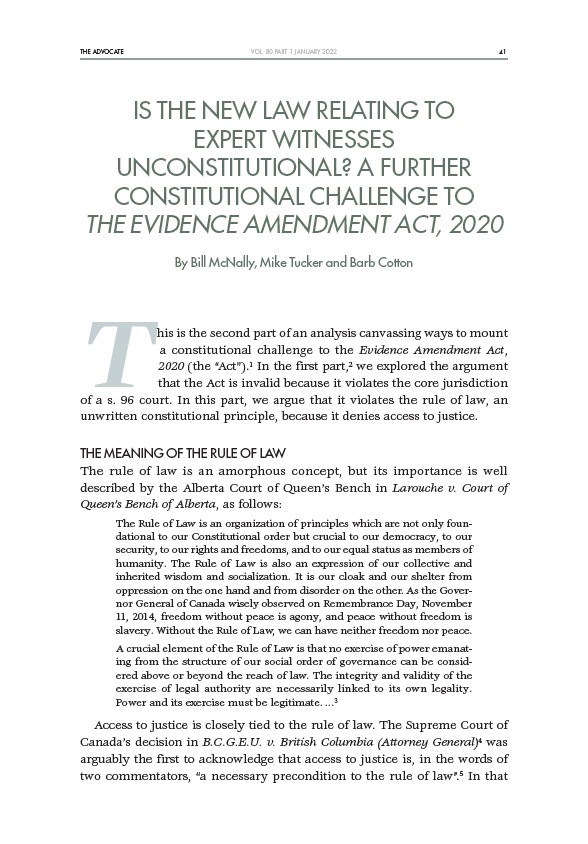
THE ADVOCATE 41
VOL. 80 PART 1 JANUARY 2022
IS THE NEW LAW RELATING TO
EXPERT WITNESSES
UNCONSTITUTIONAL? A FURTHER
CONSTITUTIONAL CHALLENGE TO
THE EVIDENCE AMENDMENT ACT, 2020
By Bill McNally, Mike Tucker and Barb Cotton
T his is the second part of an analysis canvassing ways to mount
a constitutional challenge to the Evidence Amendment Act,
2020 (the “Act”).1 In the first part,2 we explored the argument
that the Act is invalid because it violates the core jurisdiction
of a s. 96 court. In this part, we argue that it violates the rule of law, an
unwritten constitutional principle, because it denies access to justice.
THE MEANING OF THE RULE OF LAW
The rule of law is an amorphous concept, but its importance is well
described by the Alberta Court of Queen’s Bench in Larouche v. Court of
Queen’s Bench of Alberta, as follows:
The Rule of Law is an organization of principles which are not only foundational
to our Constitutional order but crucial to our democracy, to our
security, to our rights and freedoms, and to our equal status as members of
humanity. The Rule of Law is also an expression of our collective and
inherited wisdom and socialization. It is our cloak and our shelter from
oppression on the one hand and from disorder on the other. As the Governor
General of Canada wisely observed on Remembrance Day, November
11, 2014, freedom without peace is agony, and peace without freedom is
slavery. Without the Rule of Law, we can have neither freedom nor peace.
A crucial element of the Rule of Law is that no exercise of power emanating
from the structure of our social order of governance can be considered
above or beyond the reach of law. The integrity and validity of the
exercise of legal authority are necessarily linked to its own legality.
Power and its exercise must be legitimate. …3
Access to justice is closely tied to the rule of law. The Supreme Court of
Canada’s decision in B.C.G.E.U. v. British Columbia (Attorney General)4 was
arguably the first to acknowledge that access to justice is, in the words of
two commentators, “a necessary precondition to the rule of law”.5 In that